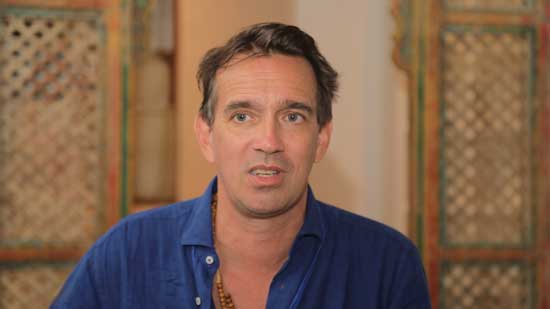Finding answers to “questions no one asked”
Peter Frankopan, Oxford historian, was first enticed by history in the 1970s, during summer holidays as a child in rural Sweden visiting his maternal grandfather (his paternal line was the ancient Frankopan family from Croatia) where in a house in the middle of a forest, the only entertainment was cricket and the library.
Grandpa Detter’s library was a treasure trove of Russian history, from the pre-revolutionary land of the Tsars down to the 20th Century. In that quiet place lulled by the trees and shadows, Peter journeyed to the past. When he later became a historian, it would be places like the Byzantine Empire, the Russias, the Balkans and the Caucasus that he would choose to specialise in. He was ‘always interested’ in things others did not take a particular shine to.

Peter Frankopan
Peter today is best known as the author of the Silk Roads books, two works that constitute a new history of the world with the idea that the world’s centre lies to the east (more specifically Persia). They received an excellent reception.
For Peter, the most absorbing thing about researching for the Silk Roads were the travellers’ tales he came across. A Chinese traveller wrote “I don’t know what the people are like in Mecca… but… I’ve heard that when they go there they cry tears that turn into pearls…” or another observation that went: “I’ve heard that in Spain there are sheep bigger than human beings. I don’t know whether any of it’s true- but I’ll try to find out.”
Growing up in England, Peter’s father was Louis Doimi de Frankopan and his mother Ingrid Detter was a famous barrister. His sister grew up to marry Nicholas Windsor, the Duke of Kent’s son. After Eton, Peter went to Cambridge before Oxford. He is married to the Sainsbury heiress Jessica Sainsbury.
One liberal habit Louis and Ingrid cultivated was encouraging the children to ask questions. Peter found himself puzzling as to why he didn’t know anything about the history of countries like Vietnam and Cambodia (very much in the news then) and countries like Sri Lanka producing first-class cricketers like Sidath Wettimuny (he has always been very much a cricket lover and even played for the Croatian team). It was finding answers to “questions no one asked” that led him to be one of the world’s leading historians.
Peter, apart from being the Director of the Oxford Centre for Byzantine Research, was called a ‘literary star’ by the Times (of UK) and a ‘rock star don’ by the BBC. Brazil’s DCM magazine called him ‘the first great historian of the 21st century.’
As advice for people writing history Peter says it is important to read not only history but also other books including novels to learn to keep readers engaged.
As an undergraduate, he listened to a professor expounding on the intricate connections that Constantinople of the Byzantine Empire, the modern-day Istanbul, had with Sweden, Scandinavia, Iceland, Spain, North Africa, Baghdad, Iraq, and China and was hooked. Peter is in a sense a pioneer in the trend of writing connected histories rather than dealing in ‘one part of the world’ – ‘longer periods and bigger regions’ than usual. He thinks England and the West must pay a lot more attention to the history of Asia and some places in Africa.
Asked if all history writing should be glamorous and pacey, he is partly of the old school and thinks “if you are curious, anything can be interesting”, pointing out that there are glints of curiosity even in the midst of ‘very dry’ history like a record of a man in Mesopotamia 5000 years ago complaining about the low quality of some copper he had bought- strangely similar to today.
Among Peter’s other books are The First Crusade: The Call from the East (2012) which narrated that crusade from the perspective of the East, using sources in Greek, Armenian, Arabic and Syriac that have been overlooked or ignored.
The Earth Transformed: An Untold History (2023) gives us a new lens through which to look at human history: our environment. Looking at how history was shaped by weather, climate and environmental factors- it has interesting insights like how the Roman Empire emerged supreme from around 100BC to AD200 in a ‘warmer than average’ period, and also a rapid growth in humans when global temperatures rose 12,000 years ago.
Peter is no prolific spinner of books. He takes time with each, writing usually between 10 in the night and 4 in the morning. He says writing a book (borrowing a cricket metaphor) is like ‘building an innings’. “You don’t need to decide quickly… to play well you need to have a good idea, you need to become comfortable- you need to get yourself well set. When that happens, everything becomes… easier…”
Searching for an ideal partner? Find your soul mate on Hitad.lk, Sri Lanka's favourite marriage proposals page. With Hitad.lk matrimonial advertisements you have access to thousands of ads from potential suitors who are looking for someone just like you.


